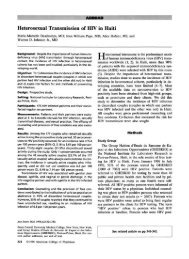Behavioural Surveillance Surveys - The Wisdom of Whores
Behavioural Surveillance Surveys - The Wisdom of Whores
Behavioural Surveillance Surveys - The Wisdom of Whores
Create successful ePaper yourself
Turn your PDF publications into a flip-book with our unique Google optimized e-Paper software.
<strong>The</strong> process <strong>of</strong> building partnerships and<br />
agreement is fundamental to ensuring that<br />
BSS produces results that are both usable and<br />
used. <strong>The</strong> ideas and resources contributed by<br />
different partners greatly strengthen the value<br />
<strong>of</strong> the data collected. But it is worth noting<br />
here that this process can be time-consuming<br />
and occasionally frustrating, especially during<br />
the very first round <strong>of</strong> BSS. Those managing<br />
the process would do well to plan realistically<br />
for the time and resources consumed by this<br />
preparatory phase.<br />
Public health <strong>of</strong>ficials and other government<br />
agencies<br />
BSS is a core part <strong>of</strong> a second generation<br />
surveillance system for HIV. It is therefore<br />
most likely to occur under the leadership <strong>of</strong><br />
the national AIDS program or a national<br />
epidemiological monitoring center. Besides<br />
managing the systems that generate HIV<br />
surveillance data (both behavioral and<br />
serological) public health <strong>of</strong>ficials are likely to<br />
be the prime users <strong>of</strong> the data. <strong>The</strong> whole<br />
point <strong>of</strong> surveillance systems is, after all, to<br />
provide information to improve the prevention<br />
and care programs led by these same <strong>of</strong>ficials.<br />
It should be noted that this leadership role<br />
does not mean that public health <strong>of</strong>ficials<br />
necessarily have to implement the surveys<br />
themselves. Staff in national AIDS programs<br />
are <strong>of</strong>ten overworked as it is, and experience<br />
with social and behavioral research may be<br />
limited among program staff. <strong>The</strong> surveys<br />
and the data analysis may be undertaken by<br />
a variety <strong>of</strong> institutions, ranging from local<br />
universities to market research firms to<br />
non-governmental development organizations.<br />
But if the results <strong>of</strong> the data collection are to<br />
meet their needs, program <strong>of</strong>ficials will want<br />
to maintain a leading role in overseeing the<br />
choice <strong>of</strong> respondent groups, indicators, etc.,<br />
as well as in disseminating the data and<br />
lobbying for its effective use.<br />
Public health <strong>of</strong>ficials in the national AIDS<br />
program and elsewhere are also well placed<br />
to seek support from other quarters <strong>of</strong><br />
government. Often, formal approval for<br />
research on human subjects must be sought<br />
from national authorities, <strong>of</strong>ten in a ministry<br />
<strong>of</strong> science and technology. Various other<br />
ministries may also be able to help facilitate<br />
access to groups to be included in surveillance.<br />
Education <strong>of</strong>ficials can help provide a sampling<br />
frame and work to secure head teacher support<br />
for surveys among students, for example,<br />
while the defense ministry might facilitate<br />
access to groups <strong>of</strong> soldiers.<br />
Agencies that might obstruct progress if<br />
they misunderstand the purpose and goals<br />
<strong>of</strong> behavioral surveillance should also be<br />
consulted early on. <strong>The</strong> support <strong>of</strong> the<br />
interior ministry or the police authorities can<br />
be crucial to the smooth implementation <strong>of</strong><br />
BSS among groups such as drug injectors<br />
whose behavior is illegal. Once these<br />
authorities are fully informed <strong>of</strong> the purpose <strong>of</strong><br />
BSS by their colleagues in the health ministry,<br />
they are <strong>of</strong>ten in a position to <strong>of</strong>fer constructive<br />
suggestions which will improve the eventual<br />
outcome <strong>of</strong> the data collection exercise.<br />
Organizations providing services to<br />
communities at risk for HIV<br />
In many countries, the majority <strong>of</strong> services<br />
for members <strong>of</strong> sub-populations at especially<br />
high risk <strong>of</strong> exposure to HIV are provided by<br />
non-governmental organizations (NGOs).<br />
<strong>The</strong>se NGOs have an important contribution<br />
to make in planning BSS activities for two<br />
main reasons.<br />
12<br />
C H A PTER 2 B EHAV I OR A L S U R V EI L L A NC E S U R V EY S










